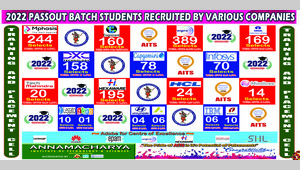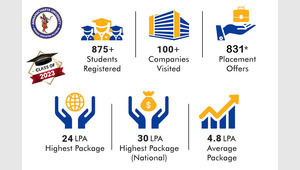Department
Artificial Intelligence & Machine Learning
Workshops/Training Programs
Workshops and training programs at universities offer targeted learning experiences designed to develop specific skills, knowledge, and competencies. Here’s an overview of different types of workshops and training programs commonly available, along with their benefits:
Types of Workshops
- Academic Skills Workshops
- Research Skills: Includes sessions on conducting literature reviews, designing research methodologies, and writing research papers.
- Writing Workshops: Focuses on improving academic writing, thesis development, and citation practices.
- Presentation Skills: Training on delivering effective presentations, creating impactful slides, and public speaking techniques.
- Professional Development Workshops
- Career Exploration: Helps students identify career interests, set goals, and understand industry trends.
- Resume and Cover Letter Writing: Provides guidance on crafting resumes and cover letters that stand out.
- Interview Preparation: Offers tips and practice for job interviews, including common questions and effective responses.
- Technical Skills Workshops
- Software Training: Hands-on training for software tools relevant to specific fields, such as statistical analysis software, graphic design programs, or programming languages.
- Data Analysis: Workshops on analyzing and interpreting data using tools like Excel, SPSS, or R.
- Personal Development Workshops
- Time Management: Strategies for effective time management, prioritization, and productivity.
- Stress Management: Techniques for handling academic and personal stress, including mindfulness and relaxation exercises.
- Leadership and Teamwork: Developing leadership qualities and effective team collaboration skills.
- Creative and Artistic Workshops
- Creative Writing: Workshops focused on various forms of creative writing, including fiction, poetry, and scriptwriting.
- Art and Design: Sessions on different art techniques, design principles, and digital media creation.
Types of Training Programs
- Certification Programs
- Industry Certifications: Programs that prepare students for certifications in areas like project management (PMP), information technology (CompTIA), or digital marketing (Google Analytics).
- Professional Development: Specialized training that may lead to certifications or credentials in fields such as teaching, healthcare, or finance.
- Internship and Co-op Programs
- Practical Experience: Provides hands-on experience in a professional setting related to a student’s field of study.
- Career Exploration: Allows students to explore different career paths and gain real-world experience.
- Research Training
- Graduate Research Workshops: Focus on advanced research skills, grant writing, and academic publishing.
- Research Assistantships: Opportunities to work closely with faculty on research projects, gaining practical research experience.
- Entrepreneurial Programs
- Start-Up Incubators: Support for students interested in launching their own businesses, including mentorship, resources, and potential funding.
- Business Plan Competitions: Opportunities to pitch business ideas and win support or seed funding.
- Community and Service Programs
- Volunteering: Programs connecting students with community service opportunities, allowing them to contribute to social causes.
- Service Learning: Integrates community service with academic learning, enhancing both personal and academic development.
Benefits of Workshops and Training Programs
- Skill Development: Enhance specific skills relevant to academic success, career advancement, or personal growth.
- Career Preparation: Gain practical experience and certifications that improve employability and job prospects.
- Networking: Connect with peers, professionals, and mentors, building valuable relationships and professional connections.
- Personal Growth: Develop soft skills, such as leadership, time management, and stress management, which are beneficial in all areas of life.
- Hands-On Experience: Apply theoretical knowledge in practical settings, deepening understanding and proficiency.
How to Get Involved
- University Resources: Check with career services, academic departments, and student organizations for available workshops and training programs.
- Online Platforms: Many universities offer online workshops and training programs accessible through their websites or educational platforms.
- Professional Associations: Look for industry-related organizations that may offer workshops and training relevant to your field of interest.
- Campus Events: Attend information sessions and workshops organized by campus groups, faculty, or external speakers.
Participating in these workshops and training programs can significantly enhance your educational experience and prepare you for future academic and professional endeavors.





